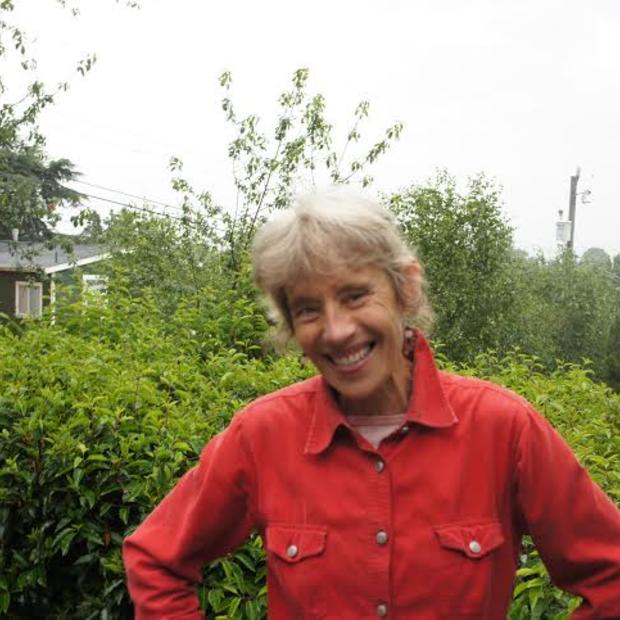Lede: The upward trend in urban farming keeps climbing. As city populations grow and urban areas increase, growing food in the city has increased by 50 percent in the last two decades. Previously these efforts were called everything from pea-patching to victory gardening. Whatever the name, the practice of growing food for family and community has become a noble and cultivated art.
Click on the audio player above or here to listen.
Narration: With Green Acre Radio this is Martha Baskin. Mel Floyd looks at rows of winter crops he’s just uncovered from plastic cocoons. Considering the location and cold winter, he’s satisfied with the yield. There are gold carrots and red carrots. “They're edible, they're sweet and good. Over there we have beets going. We've got golden beets and white beets. The next one is turnip greens and those beautiful plants over there are relatives of the artichoke. They're called cardoon.” A stone’s throw from the interstate, this grassy hillside with views of Puget Sound and Safeco Field, is being “reclaimed”. The two and half acres of land are on the south slope of Yesler Terrace Housing. The Seattle Housing Authority plans to redevelop the project with high rises and town homes. “So we won't be able to keep it forever.” Still Floyd says he and others growing food here want to show the capacity of urban ag, a capacity driven by community need. “Yeah, we're going to have a good case to present to the SHA to say we should do this again in the next development.”
Growing food here began last summer with a program called Ground Up Yesler. The idea was to give youth a voice in the redevelopment of Yesler Terrace Housing. Karen Toering is the Program Director. On this unusually warm day she can’t get the youth working the soil to take a break. “Since the sun is out the temperaturs are favorable, I can't get them to stop working today.” Syreeta Bernyl rakes compost into raised beds. Last Fall she volunteered by preparing harvested food for the community. “And then from there it's kind of, I want to do this. I want to get these gifts as well.” Bernyl pauses. Gifts. Forty foot rows to plant food are gifts not only rich in nutrients but in spiritual gifts as well. “And health of the environment, health of the dirt, the worms, and with that gift comes responsibility to treat it right, to care, because it's going to give us some beautiful, amazing food you know that doesn't taste like anything you've ever tasted before.”
Like Syreeta Bernyl, Mel Floyd knows what food grown without pesticides or additives tastes like. Roasted potatoes are a favorite. So he’s decided to conduct an experiment. Can potatoes grown in wooden crates multiply on a steep hillside? He knows fingerlings and baking potatoes cut in half, those with eyes or sprouts, will grow in the ground. The question is will they reproduce in a crate? “A good yield is eight to nine pounds back for every pound you plant.” Here’s a tip if you decide to try this. “You want them to scab over first so they don't rot in the ground. Good to go.” Line the crates with black plastic, add wood chips, compost and dirt. “Exposed on this sunny hill, the potatoes should be quite happy.” Squashes are next. After that sunflowers and broom corn for bird habitat. “And when people are driving down I-5, when they're stuck in traffic they're going to have a beautiful view of just amaranth and corn and sunflowers and birds.”
Beauty aside, coaxing healthy food from this urban hillside is the real end game. Floyd helped jump-start the youth focused Ground Up project last summer. This year he’s working another half acre for a new project, Clean Jeans, aimed at seniors. Both projects want to engage Yesler Terrace’s Southeast Asian and East African residents and grow culturally appropriate vegetables. Again Ground Up Program Director, Karen Toering. “The first thing to find out is what do the residents eat that they can't get within a quarter-mile radius of the Terace.” One vegetable many East Africans eat is purslane, a vining plant with small leaves that run perpendicular to each other. People in the U.S. think it’s a weed. “Think morning glory except the leaves are much tinier.”
Tiny newcomers to this urban farm project will likely appreciate the purslane. Just this week honeybees were delivered. Bob Redmon with Urban Bee Co. thinks they’ll do quite well. “Plenty of sunshine. It's kind of wild here actually.” Seventy of the world’s top 100 food crops are pollinated by bees. “It's a good reminder of what agriculture means. A bee's foraging area is three miles from the hive, which is pretty big.” Compare that with how much food purchased from the grocery store comes from three miles away, says Redmon. “And what goes into those foods,and to me that's the bigger importance of the bee is to remind us what we're eating and where it comes from.” Come summer, this reclaimed land will grow purslane, gold carrots, potatoes grown in crates, cardoon, broom corn, and turnip greens for this community.


